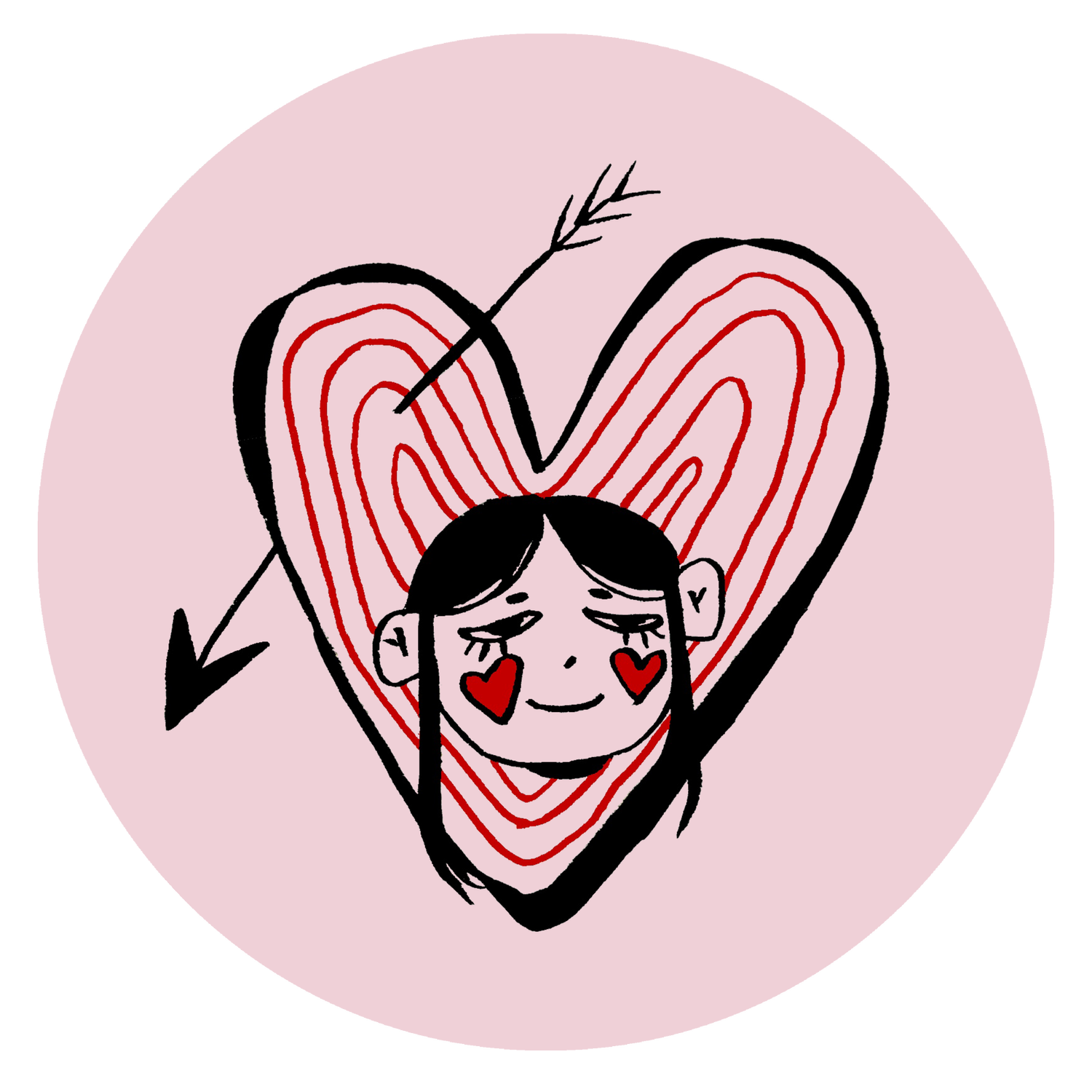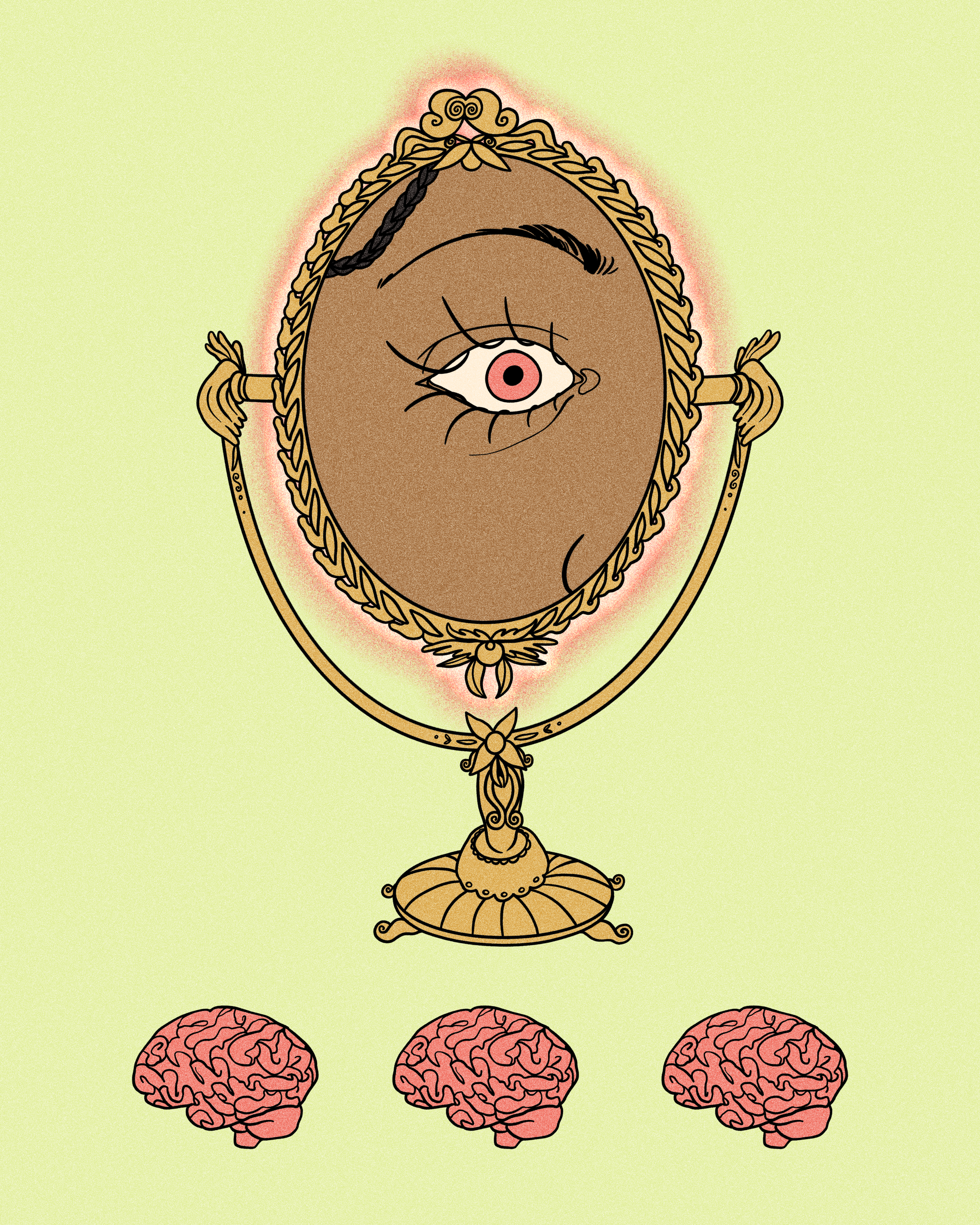The Black Writer’s Confessional
Illustration by Honey Simatupang
One night, I had this dream where I was being forced to eat what looked like brains. I remember thinking to myself, “I don’t want to eat these…why am I eating these?”
A mirror appeared in front of me and I started violently regurgitating the brains, along with a few other pink-ish meals. I woke up from the dream feeling uncomfortable with my subconscious. Thoughts spread through my head like wildfires until I finally reached that fire. The essential question. What was this dream trying to tell me?
My mind has always been my best friend and my worst enemy. The resurfacing of thoughts and ailments and wading the deep waters of emotions is a scary and long process. I believe it’s one of the ugliest processes to go through. Unfortunately, that seems to be the mind’s habitual indoctrination for writers.
After you have accepted all of the thoughts and ideas, the mind then goes on to teach you about its counterparts: the body and the soul. Just like the mind, the body and soul talk and communicate. So imagine each of these parts is twisting and pulling you in different directions and you just feel stuck. Not necessarily in negativity or fear, but in the ideas that come with them. This malfunction of the mind, body, and soul connection is often born out of confusion. More specifically, the confusion of elusive identity. This is the plight of the Black writer.
You might expect the Black writer to write about trauma, pain, grief, sadness, oppression, basic human rights labeled as “politics.” You might be touched by a Black writer. You will be touched by a Black writer. Simply put, just think about the greats: Zora Neale Hurston, Maya Angelou, Toni Morrison…need I say more? The shoulders that us Black writers stand on are always expected to carry the weight. The media often feeds us stories about what Blackness looks like. The typical stereotypes are poor, uneducated, lazy, violent and coming from a broken home. Also, if you are a Black American your ancestors were slaves and you have virtually no connection to your African roots —besides that mini-series “Roots”, which was deemed fictional— but you should still go back to your African country even though you were stolen from it. It’s all confusing when you don’t feel like you fit into any of these force-fed categories.
Elusive identity is something I struggled with growing up. As a young Black child growing up in the small town of Lacey, Washington, it was quite difficult to find myself. I knew that I was Black, of course, although I couldn’t figure out why everyone around me was so adamant about reminding me of this fact. That’s when the negative thoughts began to develop. I started to berate myself for being born into this world. I couldn’t understand why kids who looked like me and who didn’t look like me always poked and prodded at my existence as if it wasn’t as valuable as theirs.
Then, in the fourth grade, I wrote my first poem. It was titled “A Beautiful Butterfly.” At the time, I had no idea that this poem was a clear reflection of self. It was the way I saw myself in the world around me. Poetry became my key to unlocking emotional depth at a young age. With poetry came a mass collection of journals. These journals became my dearest confidants and I wrote almost everyday until my hands cramped up. I dressed my writing in oversaturated expressions, and unfiltered, authentic, raw truth. I created new worlds to feel free in. I let my right hand fly across pages after pages until I had released every single thought and idea inside of my head. I created my truth. However, it wasn’t until later that I began to embody this truth.
Writing quickly became my only form of therapy. Soon my thoughts started to become overwhelming and I couldn’t seem to dig myself up when I buried myself in them. I let them absorb me. I realized that I kept walking down the same exact path of pain, pain I believed equated to good writing. I endured pain, flirted with it, and then found comfort in my sadness immediately after. For every single bad day, I wrote. I always forgot to write about the good days.
This process of keeping myself trapped within the margins of my pain held me back from so much more. I took one glance at a “happy” poem or a “happy” journal entry, and I couldn’t believe how fake it felt. Where was the emotion? The shock? The drama? I craved chaos. I really believed that made me a better writer.
It didn’t.
My freshman year of college, I decided to put my work out there. I started sending in poetry about trauma, pain, heavy emotions. All of them, rejected. I had a streak of rejection letters and I couldn’t figure out why I wasn’t good enough. The day I figured out why was when I realized I am good enough.
I created a blog. It started out just as something for myself, but then I decided to make it this big thing. I had a launch, wrote an Instagram post about and people read it. It was powerful and validating, but also scary being so vulnerable with my truth. But that day, I swear I touched freedom.
My writing started to evolve as I grew into myself and learned more. I learned about balance, mindfulness, and care. The painful writing started to become progressive, an active form of growth manifested between margins. There was something about pain that I wanted to explore, no matter how much it hurt. So I continued to stretch myself into different possibilities, such as exploring the aftermath of pain. I realized that with every piece of pain and every obstacle, blessings appear immediately after. There is definitely magic in that.
There is definitely magic in dreams.
My interpretation of the brain-eating dream was that my thoughts and ideas were being rearranged as I grew into deeper parts of myself. I thought to myself, “I have to shed some skin to let the new company in.” This was the first time I had ever rearranged my thoughts so quickly. In an instant, my mood shifted from anxiety to comfort. This dream spoke to my truth by purging what was no longer in alignment for me.
The way I used to understand truth can be compared to the song “Strange Fruit,” originally sung by Billie Holiday. This song has always left me feeling uneasy but grounded. It’s one of the most beautiful songs I have ever heard. It’s authentic truth on full display.
But beauty and truth shouldn't always have to rely on pain.
As I continue to grow as a person and a writer, my thoughts are shifting towards evolution. My infatuation with pain and suffering has evolved into my desire for healing these generational wounds with clear intention. There is so much beauty in Blackness that goes beyond the same tired narrative of suffering. To me, the creative right is the right to alter reality as you see fit. To set yourself free. Once I realized that authenticity and truth was better than “good” writing, I began to let my hand fly again.
I promise, you can do it too.
puzzle pieces
a canopy of colors
pastels & deep hues
woven together with the intention of colliding every strand
on top of the other —
it allows me to see when darkness consumes me
color.
i imagine it vivid
with less trace and more restraint
three times as beautiful as the quilt but the quilt is needed when u lie in wake
i forget melodies
i forget dreams
but
i allow myself to weave more pieces of the canopy and lay under the masterpiece
a myriad of colors to grace the eye
i only ask that next time,
we create it together.
This poem was inspired by the quilting practices of African-American women in the Deep South. Quilting is something I want to incorporate into my own healing practices. It functions as a source of joy that connects African-Americans to their indigenous roots. Through this poem, I connect to my ancestry by wrapping the reader up inside of the image of a colorful quilt.

